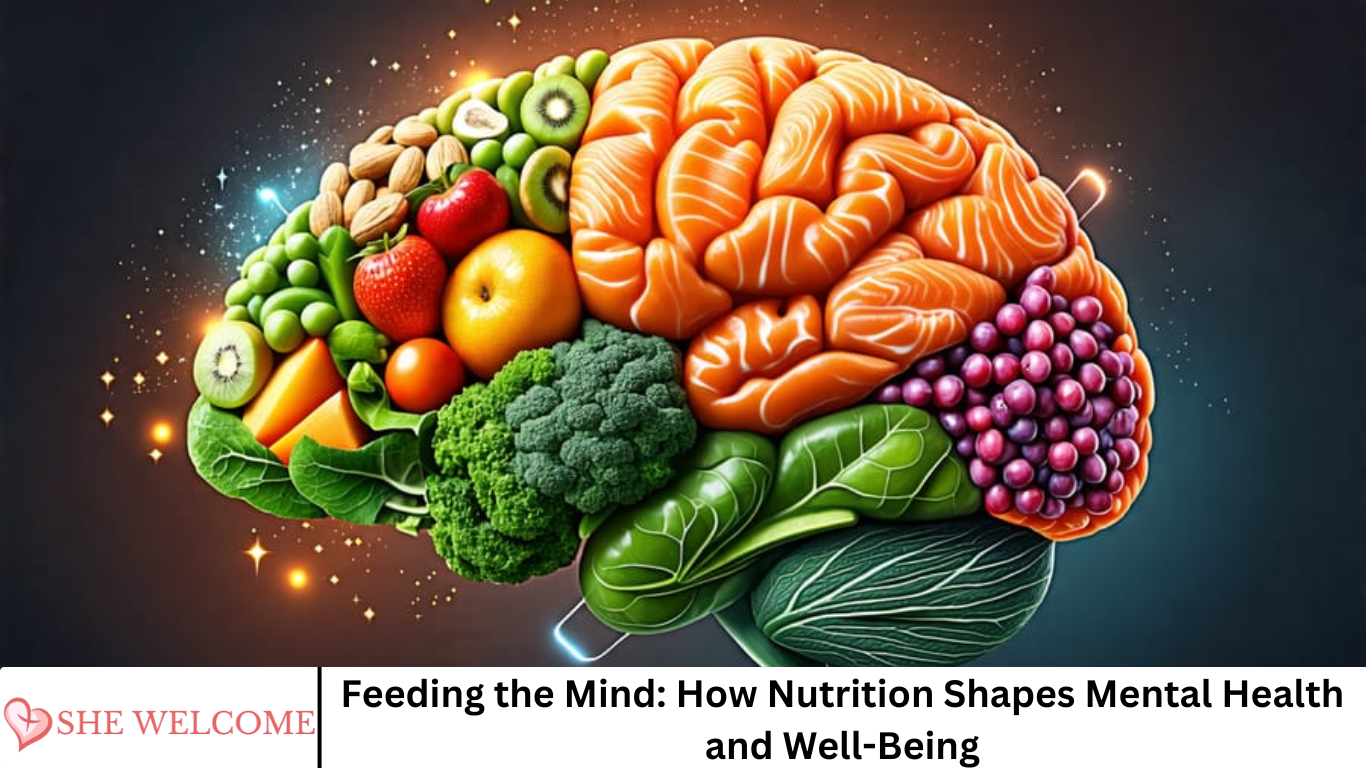In recent years, a growing body of research has highlighted the profound impact nutrition has on mental health and emotional well-being. While physical health benefits from a balanced diet are well-known, the connection between what we eat and how we feel is gaining increased attention.
This article explores the intricate relationship between nutrition and mental health, providing insight into how dietary choices influence mood, cognitive function, and overall psychological well-being.
More Read: 10 Easy Habits to Boost Your Mind, Body, and Spirit Every Day
The Brain-Gut Connection
One of the key mechanisms linking nutrition and mental health is the brain-gut connection, often referred to as the gut-brain axis. The gut, sometimes called the “second brain,” is home to trillions of microbes that influence a wide range of bodily functions, including mood regulation and cognitive function.
These gut microbes produce neurotransmitters like serotonin and dopamine, which play essential roles in regulating emotions. A healthy gut microbiome, supported by a diet rich in fiber, fermented foods, and prebiotics, can enhance the production of these neurotransmitters.
Conversely, diets high in processed foods, sugar, and unhealthy fats can lead to an imbalance in gut bacteria, contributing to inflammation and an increased risk of mental health issues such as depression and anxiety.
Nutrients That Nourish the Brain
Several key nutrients are particularly important for maintaining mental health. These include:
1. Omega-3 Fatty Acids
Found in fatty fish like salmon, walnuts, and flaxseeds, omega-3 fatty acids are essential for brain health. They support the structure of brain cells and have anti-inflammatory properties that can help reduce symptoms of depression and anxiety.
2. B Vitamins
B vitamins, particularly B6, B9 (folate), and B12, play a critical role in brain function. They are involved in the production of neurotransmitters and help regulate mood. Deficiencies in these vitamins have been linked to increased risk of depression and cognitive decline.
3. Vitamin D
Often called the “sunshine vitamin,” vitamin D has been associated with mood regulation and the prevention of mood disorders. Many people, especially those living in northern climates, have low levels of vitamin D, which can negatively impact mental health.
4. Magnesium
This essential mineral is involved in hundreds of biochemical reactions in the body, including those related to stress and anxiety management. Foods rich in magnesium include leafy greens, nuts, seeds, and whole grains.
5. Amino Acids
Amino acids are the building blocks of proteins and are crucial for neurotransmitter production. For example, tryptophan is a precursor to serotonin. Including high-quality protein sources in the diet ensures adequate intake of these important compounds.
Dietary Patterns and Mental Health
Beyond individual nutrients, overall dietary patterns play a significant role in mental well-being. Certain diets have been shown to promote better mental health outcomes:
The Mediterranean Diet
Rich in fruits, vegetables, whole grains, legumes, nuts, and olive oil, the Mediterranean diet has been associated with reduced risks of depression and cognitive decline. It emphasizes anti-inflammatory foods and healthy fats, which support brain health.
Plant-Based Diets
Diets that prioritize plant foods while minimizing processed and animal products can provide mental health benefits, particularly when they are well-balanced and include essential nutrients. A diverse intake of fruits, vegetables, whole grains, and legumes supports gut health and reduces inflammation.
Anti-Inflammatory Diets
Chronic inflammation is a common factor in many mental health conditions. Anti-inflammatory diets, which include foods rich in antioxidants and omega-3s, and exclude processed foods and added sugars, can help mitigate this risk.
The Role of Blood Sugar Stability
Maintaining stable blood sugar levels is crucial for mental clarity and emotional stability. Spikes and crashes in blood sugar can lead to irritability, mood swings, fatigue, and difficulty concentrating. To support balanced blood sugar, it’s important to:
- Eat regular, balanced meals
- Include fiber-rich carbohydrates
- Pair carbs with protein or healthy fats
- Avoid excessive sugar and refined grains
Hydration and Mental Performance
Dehydration can impair cognitive function, reduce concentration, and negatively impact mood. Drinking adequate water throughout the day is a simple yet effective way to support mental well-being. Aim for at least 8 cups (about 2 liters) of water daily, more if active or in a hot climate.
The Impact of Processed Foods and Additives
Highly processed foods, often rich in added sugars, unhealthy fats, and artificial additives, have been linked to poorer mental health outcomes. These foods can disrupt gut health, promote inflammation, and contribute to nutrient deficiencies. Reducing consumption of processed snacks, sugary beverages, and fast food can lead to noticeable improvements in mood and mental clarity.
Lifestyle Factors that Complement Nutrition
While nutrition is a cornerstone of mental health, it works best when combined with other healthy lifestyle habits, such as:
- Regular Physical Activity: Exercise boosts endorphins and supports overall brain health.
- Adequate Sleep: Poor sleep can impair cognitive function and emotional regulation.
- Mindfulness and Stress Management: Practices like meditation, yoga, and deep breathing help regulate the stress response.
- Social Connection: Strong relationships and social support are essential for mental wellness.
Practical Tips for Eating for Mental Health
Implementing dietary changes doesn’t have to be overwhelming. Here are some practical tips to get started:
- Plan Balanced Meals: Include a source of protein, healthy fat, and fiber-rich carbohydrates at each meal.
- Add More Color: Eat a variety of colorful fruits and vegetables to ensure a wide range of nutrients.
- Cook at Home: Preparing meals at home allows you to control ingredients and make healthier choices.
- Read Labels: Be mindful of added sugars, artificial ingredients, and highly processed components.
- Practice Mindful Eating: Pay attention to hunger and fullness cues, and enjoy meals without distractions.
Frequently Asked Question
How does nutrition affect mental health?
Nutrition impacts mental health by influencing brain chemistry, hormone production, and the gut microbiome. Nutrient-rich diets support mood stability, cognitive function, and emotional resilience, while poor diets increase the risk of depression, anxiety, and mental fatigue.
What are the best foods for improving mental well-being?
Foods that benefit mental health include fatty fish (rich in omega-3s), leafy greens, nuts, seeds, whole grains, berries, and fermented foods. These support brain function, reduce inflammation, and promote a healthy gut-brain connection.
Can poor diet contribute to mental health disorders?
Yes, diets high in processed foods, refined sugars, and unhealthy fats can lead to nutrient deficiencies, inflammation, and imbalances in the gut microbiome, all of which are associated with a higher risk of anxiety, depression, and cognitive decline.
What role does the gut microbiome play in mental health?
The gut microbiome influences the production of neurotransmitters like serotonin and dopamine. A healthy microbiome, supported by fiber-rich and fermented foods, can enhance mood and reduce symptoms of stress and anxiety.
Which vitamins are most important for mental health?
Key vitamins for mental health include B vitamins (especially B6, B9, and B12), vitamin D, and magnesium. These support neurotransmitter production, energy metabolism, and stress regulation.
Can hydration influence mood and cognition?
Absolutely. Even mild dehydration can impair cognitive performance, reduce concentration, and negatively impact mood. Drinking enough water daily is essential for maintaining mental clarity and emotional balance.
Are there specific diets recommended for mental well-being?
Yes. Diets like the Mediterranean diet, anti-inflammatory diets, and well-balanced plant-based diets are linked to improved mental health outcomes. They emphasize whole, nutrient-dense foods and limit processed items.
Conclusion
The connection between nutrition and mental health is undeniable. By making informed dietary choices, we can support our brains as well as our bodies. A nutrient-rich, balanced diet—combined with healthy lifestyle practices—can enhance mood, improve cognitive function, and foster emotional resilience. As research continues to evolve, one thing is clear: the journey to better mental health begins on our plates.


